
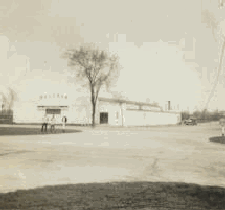
After we finished Basic Training we were allowed to wear civilian clothes while on pass, off duty in town. This made it much easier to make friends with the girls in Junction City. The U.S.O. had many dances, both on and off post.
One of my best friends was a Dorothy Miller, a very nice and pretty girl. She even participated in the Junction City Miss Kansas contest. She didn't win but made a good showing. I even had a seat down in front. We were really good friends but never did get serious. She was a very nice girl. Her father was a retired army man and he didn't believe in any hanky-panky. He made me understand that his little girl was very special to him.
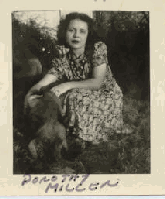
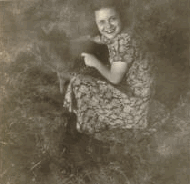
At one of the U.S.O. Dances on base an Army Photographer took a picture of me dancing with another girl I danced a lot with. He gave me one of the pictures, which was excellent, especially of her in her cute flowered dress with big bows (Picture also in one of my albums). I found out later that her father was one of the town's biggest bootleggers. She also was a very nice girl.
Speaking of bootleggers, Kansas was dry and the possession of whiskey was illegal. Even the beer on post could not exceed 3.2% alcohol. You could buy alcohol but it had to be done on the sly. The "old timers told us that we should be aware that the M.P. (Military Police) would stop GIs in town and confiscate the whiskey for themselves.
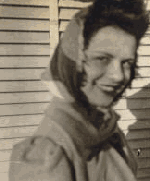
One night as my buddy and I were going out on the town we had purchased a pint of whiskey at a bootlegger's house. We had just left the house and an M.P. stepped out from behind some bushes and demanded the "brown bag" of whiskey. I wasn't about to donate our pint to an M.P. so I just dropped the bag on the sidewalk. That was the end of the "evidence" and a frustrated M.P. left us with a few choice cuss words.
All of the M.P.'s were not bad. Joe Louis, the boxer was an M.P. there in the 1940's. He also used to box exhibitions at Fort Riley. He got an awful lot of respect when he was on duty in town. I never did run into him. I might have given him the bag.
While in Basic Training I was fortunate enough to be appointed a Sunflower Corporal. We wore armbands with a Sunflower on it. These Corporals had some extra responsibility but received some extra benefits like relief from K.P. (Kitchen Police) or Garbage Detail.
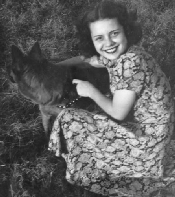
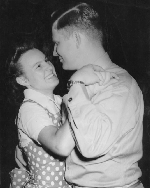
Being a Sunflower Corporal helped me to stay on in the training unit after most of the other trainees had been shipped out to the camps. "Fumbles" bottles had been a good investment.
Staying behind now allowed me to work in the kitchen while waiting for the new batch of trainees to come in. The kitchen prepared meals for people such as Headquarters, the Fireman, the Camp Baseball team etc. Met Hauck there. He later became the Detroit Tiger manager.
Before that new group of recruits showed up I was transferred to Headquarters Company, 2nd Cavalry Division stationed at Camp Finston adjacent to Fort Riley. On reporting for duty, I found out that the 2nd Cavalry Division was still away on maneuvers in Louisiana and would be gone for another three weeks. Then followed three weeks on assorted duties. K.P., Janitorial Services, Motor Pool Duty, Supply Room Work, Barrack Maintenance, etc.
When the 2nd Cavalry Division finally arrived back in camp I was assigned to jobs on a more permanent basis. For awhile I was a "Dog Robber". Dog Robbers are enlisted men who are assigned to high-ranking officers as Colonels and Generals. Your job is to spend the day at the residence of the officer doing whatever needs to be done, such as cutting the grass, shining the brass, shoes, boots, saddles and even walk the dog. It was a real "cush" duty. An army sedan would pick me up at my barracks, deliver me to my colonel's house in Fort Riley and take me home for supper. On a job like this you were excused from other duties like K.P. or Guard Duty. I did have to pull Guard Duty as I was pulled off my "Dog Robbing".
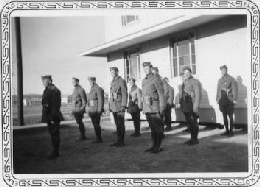
Guard Duty is a pretty responsible job. You walk your Guard Post with a loaded 45 cal. Automatic pistol. After Pearl Harbor Guard Duty became very scary. In fact things did happen one night, when Levy, a Jewish New York soldier shot himself by putting the 45 in his mouth and pulled the trigger. He had been a Postal Clerk in New York City and he had had trouble adjusting to the complete discipline of Army Life. He took what he thought was the easy way out. His bunk in the barracks was two down from me. His suicide hit us hard. He was Jewish. Another time a fellow had just come off of Guard Duty was cleaning his 45 and discharged it. I was lying on my bunk and the bullet went a foot over my head.
One of my most scary nights on Guard Duty took place after Pearl Harbor. The entire camp was on "Top Alert". I was assigned to a Guard Post in the Horse Stables area.
The stable area housed a couple of thousand horses. Two thousand horses make a lot of weird noises. They urinate loudly, they defecate loudly, they flatulate (break wind loudly), whinny, snort and a hundred other noises. In addition, occasionally one would break out of his stall and run wild. I have never been a horse lover so I was really glad when that 24 hour Guard Mount was over.
I mentioned Pearl Harbor earlier. I do vividly remember that day in Kansas. Had a Sunday afternoon movie date with Dorothy Miller. Right in the middle of the movie the house lights came on and a Military Police Officer came on the stage and announced that the Japanese had bombed Pearl Harbor and that all Military Personnel must report back to their units back at camp immediately.
All personnel did report back for a hectic 72 hours. All units were alerted to be ready to move out at a moment's notice. That night the West Coast even expected further attacks by the Japs. Rumors had the 2nd Cavalry Division going to the West Coast. We were packed and ready to go. I had a scheduled Dental appointment. I had scheduled the appointment because I had planned to take a furlough for Christmas. I kept the appointment even though all furloughs had been cancelled. I heard our President, Franklin Delano Roosevelt's famous "Day of Infamy" speech while sitting in a Dentist's chair at Fort Riley, Kansas.
Surprisingly the cancelled furloughs were reinstated a week before Christmas and I was fortunate enough to get one. I took the bus from Junction City to Kansas City then the Burlington Zephyr to Chicago. There was not an immediate train to Muskegon. I took a cab to the Outer Drive and started to hitchhike home to the Heights. After five rides I was home. I hadn't had time to notify my parents of my furlough so I surprised them.
I opened the back door. They were just sitting down to supper. I threw my bag in and said "Set another place for me". They were surprised. It was a good time to be home on furlough. The people were wonderful. I enjoyed that furlough because I knew that my 14-month military obligation could now stretch into years.
Prior to getting this Christmas Furlough in December 1941 I had been scheduled for tonsillectomy surgery at Fort Riley. So on my return to Fort Riley, I checked into the base hospital.
A doctor, a full Colonel, examined me and saw something unusual about my tonsils, which had been giving me a lot of trouble. Three other doctors observed the operation. It was routine and a week later I was back on full duty.
The 2nd Cavalry Division was stationed at Camp Funston. Since we were now further from Junction City we now proceeded to spend our free, off duty time in Manhattan, Kansas, the home of Kansas State University. Even attended a number of dances at the University. Had a good friend, one Marjorie Wells, a nice person but nothing serious. Manhattan also had more than it's share of Honky Tonks. Me and my buddies did frequent a few of them but not with Marjorie Wells. She drew the line on Honky Tonkin.
Manhattan did not have a Roller Rink so I sent my skates home after that weekend in Kansas City and the skating at the Playmor in Kansas City.
A curious thing about that weekend in Kansas City. I did skate some skate dances with a girl I don't even remember her name. We talked, I gave her my name and hometown, Muskegon Heights. Never thought the evening would come up again.
However, long after my return to civilian life I ran across an old friend, one Beaver Semyn, who told me that while stationed in Kansas City he met a girl who knew a John Jozsa from Muskegon Heights. What a small world we do live in.
In June of 1942 things began to change. In the wisdom of the Army it was decided to do away with the Cavalry Division and go with Armored Divisions. Hitler caused this.
Approximately 1000 members of the 2nd Cavalry Division were to be transferred to Fort Knox, Kentucky and were to become the nucleus or Cadre for the newly activated 8th Armored Division.
The 1000 member unit from Fort Knox would then become the nucleus or Cadre for the newly activated 9th Armored Division at the Fort Riley/Camp Funston.
This was the beginning of the buildup which would eventually result in the formation of the 10th, 11th, 12th, 13th, 14th, 16th, and 20th Armored Division.
We had an important part in providing the cadre for the new divisions. The 9th Armored Division would remain an active Division while the 8th Armored Division at Fort Knox would train and supply cadre for the 7 new armored divisions. We worked with select recruits. By 1943 the 8th Armored had completed its Cadre Formation for the new Divisions and then became an active armored Division and was transferred to South Camp Polk in Louisiana for Combat Training.
On first arriving at Fort Knox in 1942 I was assigned to "D" Company of the 53rd Armored Engineer Battalion. Apparently the army in its wisdom had figured that a core assembler in a foundry would make an excellent Engineer. It was tough going for me. It seemed that I spent every waking hour with field manuals on every phase of Engineering.
Becoming an armored Engineer, required a lot of new learning. In addition to learning all this "new stuff", we then had to teach it to carefully screened recruits so that they in turn teach their recruits to be trained Armored Engineers.

"D" Company of the 53rd Armored Engineer Battalion were a very special group of people. The company was led, driven, inspired by one Capt. Edgar J. Albrick. He was a real live inspirational leader. My one regret was that I couldn't go overseas with him. He probably would have gotten all of us killed. But he surely was inspiring. He was also somewhat of a rebel. His men loved him and swore by him. The other officers hated his guts and swore at him. His actions were like a Bantam Rooster, cocky, sure, unafraid and never asked anyone to do what he wouldn't do. He believed in discipline but found time and ways to be human and have fun. He was truly a "free spirit" but still very competitive. I loved and respected him. At the age of 16 he had been offered a contract to play professional baseball but turned it down and joined the Army instead.
Capt. Albrick worked his way up through the enlisted man ranks and went to Officer Candidate School. He was also one of the youngest Captains in the entire 8th Armored Division. The Captain got in trouble by going against the grain or establishment. A good example of that was one hot, humid, summer day in Louisiana. Battalion regulations stated that while working on duty, full field uniforms would be worn, including cartridge belts, leggings, helmets, etc. The Captain saw no harm in having the men get rid of some of their equipment as we built a pontoon bridge across a small lake in Louisiana on a very hot and muggy day.
He expected the Colonel, who was always at odds with the Capt. to check up on him. So the Capt. posted lookout guards on the roads to warm us of the Colonel's approach. However the Colonel outfoxed the Capt. and went cross country with his jeep and missed the guards. The Company was caught with a beautifully completed bridge and a company with shirts off, leggings off etc. We were in deep trouble for violating the Colonel's rules. We expected to be punished in some way. As punishment, the Colonel ordered the Company Officers and non-commissioned officers to walk the 28 miles back to camp the next morning. The Colonel would send trucks out to transport the enlisted men back to camp at South Camp Polk. We were really going to be punished.
After the Colonel had announced our punishment and had left, Capt. Albrick called his officers and non-coms to a meeting and planned the next day's strategy. After supper he sent Sgt. Alley, the Mess Sgt. to go back to Camp Polk and to pick up a number of cases of beer, all iced down.
The next morning at the appointed hour we started our march back to Camp. It was warm but the beer was cold. It really was tough going but we were highly "motivated". I think there were times when the Capt. signaled us to "double time". 5 hours 45 minutes later we arrived at the Battalion Area with a new Division record for the 28 mile hike. Then, to top it off the Capt. marched us all around Battalion Headquarters and led us in singing the
|
Engineers Song
We're the boys from the Engineers
You hear so much about
The people stop and stare at us
Whenever we're about
For everything we do
We're noted for our decency
The people always like us
We hope you like us too
As we go marching
The boys from the 53rd
Are on their way.
|
The 8th Armored Division Paper wrote up our achievement of setting a new 28 mile record (5 hours 45 minutes), it didn't mention the cold beer.
The Colonel did not dole out any additional punishment to us but we did notice that "D" Company got stuck with some pretty dirty deals. If it was bad and dirty, it was assigned to "D" Company. Shortly after the 28 mile hike incident the army reorganized its Table of Organization For Engineering Battalions and "D" Company was wiped out and I and many others ended up in "A" company under Capt. J.J. Gettings. He was a good man but he was not a Capt. Albrick.
Capt. Albrick was transferred to an engineering Unit in England where his unit was training for the Invasion of France. He landed on "D" Day and survived that day and the war.
A weird incident happened just before the outfit broke up. . .
Capt. Albrick had somehow met a Dan Fietel of Crowley, LA. Mr. Fietel was the owner of many rice producing companies in Louisiana and Arkansas. He was many times a millionaire. Capt. Albrick and Dan Fietel made arrangements for "D" Company to spend a weekend in Crowley, LA. We stayed in the City Park. We were wined and dined and danced with and entertained royally by the people of Crowley. The city is still known as the Rice Capital of LA. It was a very worthwhile weekend. We had a good time and made contacts for future weekends. Mine happened to be a dark haired Jewish girl, Carole Rademersky. Her family owned the local department store. She was a very pleasant person and I looked forward to seeing her again, but we never got serious.
We did meet Dan Fietel and got along very well with him and his family. He insisted that whenever we were in town to stop over and see him. He kind of adopted Capt. Albrick like a son.
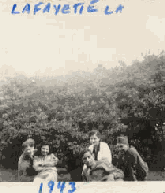
Whenever we did stop in he always provided us with a bottle of good whiskey. This was when whiskey was almost impossible to find. He also invited us to Sunday Dinner. His only stipulation was that we attend the Sunday Mass at the Catholic Church. After one of these Sunday Dinners the Fietel family invited us into an elegant living room. Dan's sister, who at times appeared weird to me agreed to read Tarot Cards for us to predict our futures. At that reading, she predicted that great changes would occur in our lives, that we would all be separated and that one of us would be very seriously injured. Two weeks later orders came out and reorganized the Engineers and "D" Company was dissolved and we were all scattered to the four winds. Two weeks later, Sgt. Corgel , one of our Sgts., who had been at the Tarot Reading was seriously injured in an auto accident.
This card reading by Dan Fietel's sister did predict some of our futures. In the Reorganization Set up Capt. Albrick was transferred to England. Capt. Albrick returned to Crowley after the war and attended College in Lafayette, LA. I will write later of after the war contacts with Capt. Albrick.
Having made the initial contacts in Crowley we continued to return to the area. Or you might say, we switched our "Theater of Operations" to Lafayette, LA, a town very close to Crowley.
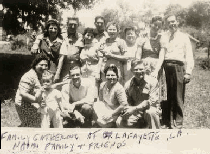
I was good friends with a Syrian from Springfield, Mass. His name was Charlie Saab and was a Sgt. in "A" Company. Charlie's family were very well off. They owned a textile factory in Springfield, Mass. Charlie had a Buick Roadmaster that he kept in Camp Polk. Gas was rationed but Charlie got all the gas coupons he needed from home. Thus we had "wheels" and could go wherever we wanted to on the weekends. The town of Lafayette was over 100 miles from Camp Polk , which meant a short 2 hour drive. We always had cold beer too. We also stopped at a bar called the Kindergarten located in Kinder, Louisiana for a pit stop. The reason we concentrated on the town of Lafayette was that the town had a very large community of Syrians. Charlie Saab and his friends were welcomed with open arms. Charlie became very serious about a beautiful Syrian girl, an Evelyn Naomi. The father owned one of the better known bars in town.
|